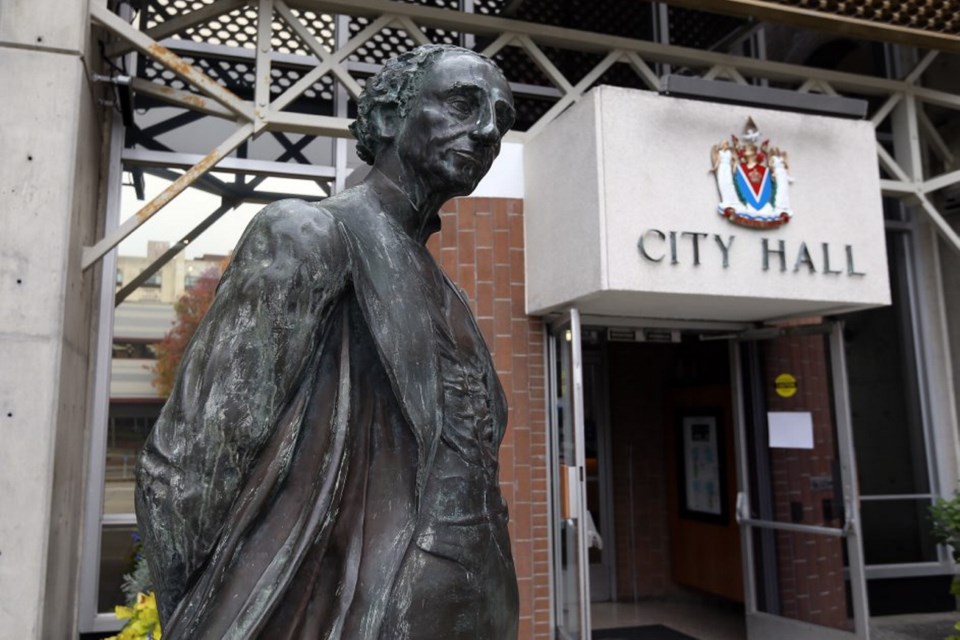Victoria’s leading mayoral candidates sparred over social issues ranging from panhandling to “renovictions” to homelessness and safe injection sites Monday as the civic election campaign entered its last week.
The debate hosted by the social justice committee of the Our Place downtown drop in centre came on the same day that two of the candidates — Ida Chong and Stephen Andrew — issued policy statements addressing aggressive panhandlers in the downtown.
Chong’s policy calls for using the city’s streets and traffic bylaw to create “special enforcement zones” to crack down on aggressive panhandling.
Asked about the policy, Mayor Dean Fortin said he totally opposed the “a red zone bylaw” that would allow officers to run out of town anyone who sits on the street or panhandles.
“This is a progressive town. We believe in the Charter of Rights and Freedoms. You don’t just get to say, ‘We don’t like the way you look. You have to leave but we’re going to keep the guys that look like us. This is not what we do,’ ” Fortin said.
Both Fortin and mayoral candidate Coun. Lisa Helps said the answer is not in criminalizing panhandling but attacking poverty by providing services such as housing and access to food and health facilities.
Chong insisted it’s her intent to go after only those who are aggressive and intimidate people such as seniors and young mothers with children. “It’s those people who have bad behaviour that intimidate … we have to ask them to move,” Chong said over some catcalls from the capacity crowd of more than 100.
Panhandling was also part of Andrew’s Healthier Safer City Plan which touches on a number of social issues. The plan’s priority is working with service providers to reduce the need for panhandling. But Andrew would also work to “vigorously enforce” existing bylaws that prohibit panhandlers from sitting on sidewalks and to crack down on aggressive panhandling — taking “escalating” action against repeat violators.
“But again, it’s aggressive behaviour downtown, we can’t have it. I don’t care whether it’s a panhandler or whether it’s somebody catcalling women downtown. It has to stop,” Andrew said.
Helps countered that often mental illness is behind aggressive behaviour. “That person needs help first and that’s our role as a compassionate, caring city. … Ask the people I live with — sometimes I can get aggressive, sometimes I can get excited, but I have the privacy of my home to do that in,” Helps said.
Andrew and Fortin also sparred over how some tenants of the View Towers apartment had been evicted after a recent fire, despite the fact there were undamaged vacant units in the building. “It still drives me crazy that there’s 100 vacant units in View Towers. That would take care of half of our problem with chronic homeless right now,” Fortin said.
Andrew said the View Towers evictions, apparently prompted by renovation plans, demonstrated a lack of leadership. The city should be taking the issue up with the province “and get them to bring in the hammer to deal with this issue,” he said.
Fortin said the mayors’ caucus of the Union of B.C. Municipalities has been lobbying the province on the issue. “Although it’s frustrating, Stephen, I can no more force you to take someone in your basement than I can force the guy in View Towers to take someone in,” Fortin said.
Meanwhile all four candidates said they support a safe injection site.
Fortin said the city is close to having two safe injection sites — transitioning the existing Access Health centre, 713 Johnson St. and Pembroke Services, 1125 Pembroke St., from health facilities that distribute harm-reduction supplies, such as clean needles and crack pipes, into supervised injection sites.



